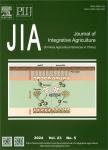Impacts of Nighttime Warming on the Soil Nematode Community in a Winter Wheat Field of Yangtze Delta Plain, China
Impacts of Nighttime Warming on the Soil Nematode Community in a Winter Wheat Field of Yangtze Delta Plain, China作者机构:Institute of Crop Sciences Chinese Academy of Agricultural Sciences/Key Laboratory of Crop Physiology Ecology & Production Ministry of Agriculture Institute of Rice Sciences Guangdong Academy of Agricultural Sciences College of Agriculture Nanjing Agricultural University Bangladesh Agricultural Research Institute Joydebpur Gazipur-1701 Bangladesh
出 版 物:《Journal of Integrative Agriculture》 (农业科学学报(英文版))
年 卷 期:2014年第13卷第7期
页 面:1477-1485页
核心收录:
基 金:supported by the National Basic Research Program of China(2010CB951501) the Key Technologies R&D Program of China during the 12th Five-Year Plan period(2011BAD16B14) the National Natural Science Foundation of China(30771278) the Innovation Program of Chinese Academy of Agricultural Sciences,China
主 题:climate warming FATI soil nematodes community structure,winter wheat
摘 要:Changes in the soil nematode community induced by global warming may have a considerable influence on agro-ecosystem functioning. However, the impacts of predicted warming on nematode community in farmland (e.g., winter wheat field) have not been well documented. Therefore, a field experiment with free air temperature increase (FATI) was conducted to investigate the responses of the soil nematode community to nighttime warming in a winter wheat field of Yangtze Delta Plain, China, during 2007 to 2009. Nighttime warming (NW) by 1.8~C at 5-cm soil depth had no significant impact on the total nematode abundance compared to un-warmed control (CK). However, NW significantly affected the nematode community structure. Warming favored the bacterivores and fungivores, such as Acrobeles, Monhystera, Rhabditis, and Rhabdontolaimus in bacterivores, and Filenchus in fungivores, while the plant-parasites were hindered, such as Helicotylenchus and Psilenchus. Interestingly, the carnivores/ omnivores remained almost unchanged. Hence, the abundances ofbacterivores and fungivores were significantly higher under NW than those under CK. Similarly, the abundances of plant-parasites were significantly lower under NW than under CK. Furthermore, Wasilewska index of the nematode community was significantly higher under NW than those under CK, indicating beneficial effect to the plant in the soil. Our results suggest that nighttime warming may improve soil fertility and decrease soil- borne diseases in winter wheat field through affecting the soil nematode community. It is also indicated that nighttime warming may promote the sustainability of the nematode community by altering genera-specific habitat suitability for soil biota.



